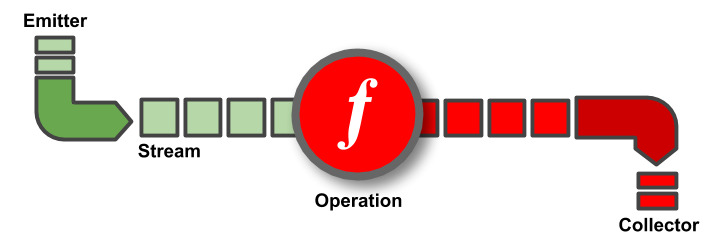vladimirvivien / Automi
Projects that are alternatives of or similar to Automi
A data stream processing API for Go (alpha)
Automi is an API for processing streams of data using idiomatic Go. Using Automi, programs can process streaming of data chunks by composing stages of operations that are applied to each element of the stream.
Concept
The Automi API expresses a stream with four primitives including:
- An emitter: an in-memory, network, or file resource that can emit elements for streaming
- The stream: represents a conduit whithin which data elements are streamed
- Stream operations: code which can be attached to the stream to process streamed elements
- A collector: an in-memory, network, or file resource that can collect streamed data.
Automi streams use Go channels internally to route data. This means Automi streams automatically support features such as buffering, automatic back-pressure queuing, and concurrency safety.
Using Automi
Now, let us explore some examples to see how easy it is to use Automi to stream and process data.
See all examples in the ./example directory.
Example: streaming from a slice into stdout
This first example shows how easy it is to compose and express stream operations with Automi. In this example, rune values are emitted from a slice and are streamed invidividually. Stream operator method Filter is applied to filter out unwanted rune values and the Sort operator method sorts the remaining items. Lastly, a collector is used to collect the result into an io.Writer and piped to stdout.
func main() {
strm := stream.New([]rune("B世!ぽ@opqDQRS#$%^&*()ᅖ...O6PTnVWXѬYZbcef7ghijCklrAstvw"))
strm.Filter(func(item rune) bool {
return item >= 65 && item < (65+26)
}).Map(func(item rune) string {
return string(item)
}).Batch().Sort()
strm.Into(collectors.Writer(os.Stdout))
if err := <-strm.Open(); err != nil {
fmt.Println(err)
return
}
}
See the full source code.
How it works
- Create the stream with an emitter source. Automi supports several types of sources including channels, io.Reader, slices, etc. (see list of emitters below). Each element in the slice will be streamed individually.
strm := stream.New([]rune(`B世!ぽ@opqDQRS#$%^&*()ᅖ...O6PTnVWXѬYZbcef7ghijCklrAstvw`))
- Apply user-provided or built-in stream operations as shown below:
strm.Filter(func(item rune) bool {
return item >= 65 && item < (65+26)
}).Map(func(item rune) string {
return string(item)
}).Batch().Sort()
- Collect the result. In this example, the result is collected into an
io.Writerwhich further streams the data into standard output:
strm.Into(collectors.Writer(os.Stdout))
- Lastly, open the stream once it is properly composed:
if err := <-strm.Open(); err != nil {
fmt.Println(err)
return
}
Example: streaming from an io.Reader into collector function
The next example shows how to use Automi to stream data from an io.Reader emitting buffered string values from an in-memory source in 50-byte chunks. The data is processed with a Map and Filter opertor methods and the result is sent to a user-provided collector function which prints the result.
func main() {
data := `"request", "/i/a", "00:11:51:AA", "accepted"
"response", "/i/a/", "00:11:51:AA", "served"
"response", "/i/a", "00:BB:22:DD", "served"...`
reader := strings.NewReader(data)
// create stream from a buffered io.Reader emitter,
// emitting 50-byte chunks.
stream := stream.New(emitters.Reader(reader).BufferSize(50))
stream.Map(func(chunk []byte) string {
str := string(chunk)
return str
})
stream.Filter(func(e string) bool {
return (strings.Contains(e, `"response"`))
})
stream.Into(collectors.Func(func(data interface{}) error {
e := data.(string)
fmt.Println(e)
return nil
}))
if err := <-stream.Open(); err != nil {
fmt.Println(err)
return
}
}
See complete example here.
Example: streaming using CSV files
The following example streams data from a CSV source file. Each row is mapped to a custom type, filtered, then mapped to a slice of strings which is then collected into another CSV file.
type scientist struct {
FirstName string
LastName string
Title string
BornYear int
}
func main() {
// creates a stream using a CSV emitter
// emits each row as []string
stream := stream.New("./data.txt")
// Map each CSV row, []string, to type scientist
stream.Map(func(cs []string) scientist {
yr, _ := strconv.Atoi(cs[3])
return scientist{
FirstName: cs[1],
LastName: cs[0],
Title: cs[2],
BornYear: yr,
}
})
stream.Filter(func(cs scientist) bool {
return (cs.BornYear > 1930)
})
stream.Map(func(cs scientist) []string {
return []string{cs.FirstName, cs.LastName, cs.Title}
})
stream.Into("./result.txt")
// open the stream
if err := <-stream.Open(); err != nil {
fmt.Println(err)
os.Exit(1)
}
fmt.Println("wrote result to file result.txt")
}
See complete example here.
Example: streaming HTTP requests and responses
The following example shows how to use Automi to stream and process data using HTTP requests and responses. The following HTTP server program streams data from the request Body, encodes it using base64, and streams the result into the HTTP response:
func main() {
http.HandleFunc(
"/",
func(resp http.ResponseWriter, req *http.Request) {
resp.Header().Add("Content-Type", "text/html")
resp.WriteHeader(http.StatusOK)
strm := stream.New(req.Body)
strm.Process(func(data []byte) string {
return base64.StdEncoding.EncodeToString(data)
}).Into(resp)
if err := <-strm.Open(); err != nil {
resp.WriteHeader(http.StatusInternalServerError)
log.Printf("Stream error: %s", err)
}
},
)
log.Println("Server listening on :4040")
http.ListenAndServe(":4040", nil)
}
See complete example here.
Streaming gRPC service payload
The following example shows how to use Automi to stream data items from a gRPC streaming sevice. The following gRPC client setups an Automi emitter to emit time values that are streamed from a gRPC time service:
// setup an Automi emitter function to stream from the gRPC service
func emitStreamFrom(client pb.TimeServiceClient) <-chan []byte {
source := make(chan []byte)
timeStream, err := client.GetTimeStream(context.Background(), &pb.TimeRequest{Interval: 3000})
...
go func(stream pb.TimeService_GetTimeStreamClient, srcCh chan []byte) {
defer close(srcCh)
for {
t, err := stream.Recv()
srcCh <- t.Value
}
}(timeStream, source)
return source
}
func main() {
...
client := pb.NewTimeServiceClient(conn)
// create automi stream
stream := stream.New(emitStreamFrom(client))
stream.Map(func(item []byte) time.Time {
secs := int64(binary.BigEndian.Uint64(item))
return time.Unix(int64(secs), 0)
})
stream.Into(collectors.Func(func(item interface{}) error {
time := item.(time.Time)
fmt.Println(time)
return nil
}))
// open the stream
if err := <-stream.Open(); err != nil {
fmt.Println(err)
os.Exit(1)
}
}
See complete example here.
More Examples
Examples - View a long list of examples that cover all aspects of using Automi.
Automi components
Automi comes with a set of built-in components to get you started with stream processing including the followings.
Emitters
ChannelCSVio.Readerio.ScannerSlice
Operators
Stream.FilterStream.MapStream.FlatMapStream.ReduceStream.GroupByKeyStream.GroupByNameStream.GroupByPosStream.SortStream.SortByKeyStream.SortByNameStream.SortByPosStream.SortWithStream.SumStream.SumByKeyStream.SumByNameStream.SumByPosStream.SumAllKeys
Collectors
CSVFuncNullSliceWriter
Licence
Apache 2.0


